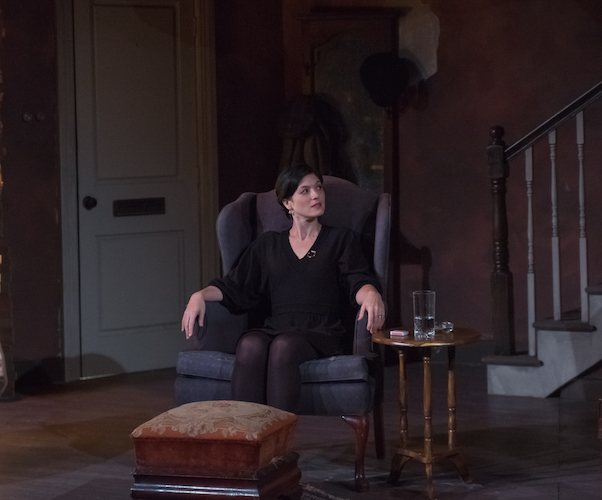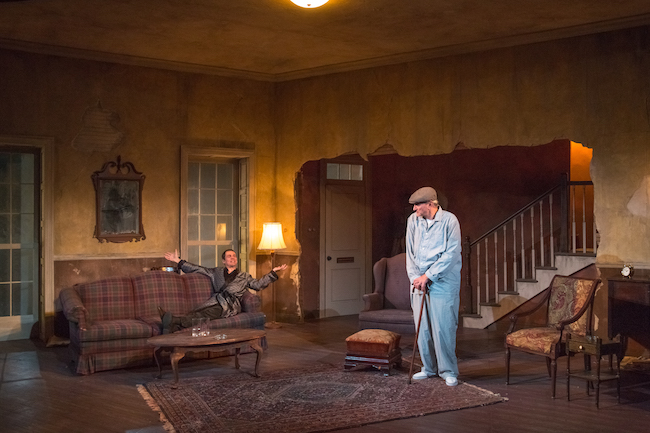Theater Review: Harold Pinter’s “The Homecoming” at the BTG—Stillborn
Pinter’s language can be enigmatic and deliberately bizarre, but it suggests arcs of passion and desire, sometimes open and sometimes repressed.
The Homecoming by Harold Pinter. Directed by Eric Hill. Staged by the Berkshire Theater Group at the Unicorn Theatre, Stockbridge, MA, through October 25.

Tara Franklin as Ruth in the Berkshire Theater Group production of “The Homecoming.” Photo: Michelle McGrady.
By Kate Abbott
The aging head of a damaged lower-class British family lives with his ineffective brother and two of his three stunted sons. When his third son, an academic in America, unexpectedly arrives with his wife, the family cracks apart. Quick-cutting asides reveal the layers of abuse the father has visited on his sons and the traumatic extent of their own violence.
Directed by Eric Hill, this production of Harold Pinter’s The Homecoming brings together a cast made up of Broadway and off-Broadway talent, so it should have the skill to master Pinter’s mocking and brutal language, which swings from homicidal viciousness to a mannered comedy edged in despair. But, surprisingly, this performance seemed stuck on a note of shrill weirdness.
As the patriarch, Max (Rocco Sisto), kept the momentum going, sometimes single-handedly, as he moved from boasting to raw anger to slick bonhomie. Together he and his youngest son Joey (Rylan Morsbach) could reach a pitch of battering resentment. His rages grated, and his shifts into a clammy politeness chilled. His Max came across at times as comic or aging when a sharper edge of aggression would have cut deeper, but he brought an emotional depth and movement to the stage that drove the action.
Pinter is well known for his terse dialogue—sentences of few words are answered by long pauses. He sets actors a challenge: to infuse emotional resonances into these short phrases. Spoken with the right tight harmonics, a line as plain as “lovely summer we’re having” can suggest fear, aggression, desire, or despair.
But here, in a pattern so consistent that it seems clearly the director’s choice, the actors filled the pauses with blankness. Around or without Max, they often spent scenes completely unmoving, and they often spoke with no expression in their faces or voices, or with a brief quirk of feature that seemed out of step with their words. Even when the script suggested movement—“that’s my father’s chair,” as though someone had touched it or thought of sitting in it—they spoke stock still from another part of the room. Even a man and woman who had just pulled each other onto the couch lounged passively.
The effect was not chilling. It was baffling. If two actors lock eyes across a stage, if they want to carry a scene between them, they need an emotion strong and clear enough to fill the space. Without movement or body language or tone of voice, we cannot read what a character feels, or how one character bears down on another.
Pinter’s language can be enigmatic and deliberately bizarre, but it suggests arcs of passion and desire, sometimes open and sometimes repressed. The action in The Homecoming is horrific and surreal, but it moves with a plan, advancing steadily into the family’s buried resentments. This family takes cycles of abuse to phantasmagorically absurd levels of viciousness and degradation. Max puts pressure on his sons and on his brother, and Ruth and her husband on each other, until it seems they should explode with it.
Instead, the characters come in on one emotional note and hold it. Lenny (Joey Collins) would begin a scene at a fever pitch, so that his emotion had nowhere to build. Needling his brother in the most base, bludgeoning language imaginable, Lenny spoke in one tone, at one volume. His voice held an unspecified menace, not anger or fear—an erratic madness.

Rocco Sisto as Max and Joey Collins as Lenny in the Berkshire Theatre Group production of “The Homecoming.” Photo: Michelle McGrady.
Occasionally, a motion like lifting a chair would take on an unexpected violence, but in general, Collins’s movements felt directionless. He gave different and elusive impressions, scene by scene, from effeminacy to delinquent violence to a passionless seduction, so that near the end, when he finally revealed the genuine threat he posed to Ruth, it seemed unbelievable. The perversion he claimed seemed out of character; instead of crushing, it confused.
And Teddy (David Barlow), shamed utterly in his marriage and his manhood, seemed to take all the punishment his family inflicted on him without comment. Teddy has made detachment and repressed emotion a protection, but a suppressed emotion can beat into a room, even, from a man standing rigid and silent. Barlow simply seemed still.
Ruth (Tara Franklin) provided fire and subtlety when given the chance. Her small motions could convey hidden turmoil—as when her hand moved to unbutton her coat and then clutched it closed, as though for protection. She could pulse with sexual power, or answer her husband’s refusal to discuss philosophy with a concise conundrum about the ambiguity of language. But she, too, seemed to shift her character from scene to scene—to leave for a walk feeling threatened in a strange place and then return wholly confident, throwing off the coat she had held to her and facing Lenny with an unexplained and unchanging smile.
Ruth as a character does shift, sometimes taking fantastic leaps, but behind (or driving) Pinter’s dark language she has frustrations, desperations, insecurities, and longings. She stands to lose her freedom, her sanity, her life, everything, but in this show’s cramped spaces, Franklin seemed to play up the role’s absurd comedy and desire. Yet in her dark, drawn-in look as she walks in the door for the first time, carrying her suitcase in the small hours, she suggests that she could bring a full weight of despair to the ending, if she were given room. But for some reason the BTG’s staging crowds its actors out.
Kate Abbott, a writer based in Western Massachusetts, served as editor of Berkshires Week and then Berkshires Week & Shires of Vermont magazine, a year-round weekly arts and cultural publication in the Berkshire Eagle, Bennington Banner, and Manchester Journal newspapers from 2008 to 2015. She holds an MFA in fiction from the University of New Hampshire, and has published poetry in journals including the Comstock Review and Entelechy International. She enjoys talking with people, walking in the woods, playing contradance recorder, and writing about all three.
Tagged: Berkshire Theater Group, Eric Hill, Harold-Pinter, Kate Abbott

I had never seen The Homecoming and looked forward to this production which was, indeed, baffling to the point of frustrating. A visiting English friend was also puzzled since this Homecoming was quite different from what she had seen twice before. Thank you Kate Abbott for giving me some perspective. I was very disappointed and somewhat repelled by these characters, but when I read this review I realized that the static, sometimes boring quality of this production was more the director’s fault than Pinter’s. There is much more here than BTG found.
Kate,
This is an excellent analysis of the role a director has in shaping a performance.